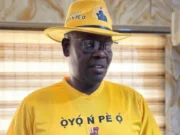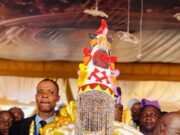The National Council of Muslim Youth Organisations (NACOMYO) has thrown its weight behind the recent policy decision of the Federal Government which recognizes National Board for Arabic and Islamic Studies (NBAIS) certificates as O’level certificates, equivalent to WAEC, NECO, and NBTE qualifications.
NACOMYO made this declaration in a statement signed by its National Secretary General, Mas’ud Akintola, to rebut the position of the National Prayer Altar.
In the statement, the organization noted that while it respects the right to express concerns, it considers the recognition of NBAIS certificates as “a constitutionally valid, inclusive, and forward-looking policy that upholds Nigeria’s rich religious diversity and educational pluralism.”
“The claim that the recognition of NBAIS certificates breaches Nigeria’s constitutional secularity is a fundamental misinterpretation of the law. Section 10 of the 1999 Constitution prohibits the establishment of a state religion; however, it does not preclude the government from recognizing religious educational qualifications that meet national academic standards. The recognition of NBAIS certificates is consistent with Nigeria’s pluralistic ethos and respects the constitutional guarantee of freedom of religion under Section 38.
“It is important to emphasize that this policy does not endorse Islam as a state religion but acknowledges an established educational framework that serves a significant segment of Nigerian students. The policy, therefore, aligns with constitutional provisions rather than contravening them.
“NBAIS certificates provide an alternative and legitimate academic pathway for students pursuing Arabic and Islamic studies—fields that are deeply embedded in Nigeria’s cultural and educational fabric. By including NBAIS qualifications in the national admissions framework, the government promotes inclusivity and diversity, reflecting Nigeria’s multi-religious identity,” the statement noted.
”Moreover, religious education is already integrated into the secular school curriculum, with both Islamic and Christian Religious Studies being taught nationwide. Thus, the policy does not introduce theological asymmetry but rather formalizes existing educational realities.
“Contrary to assertions of a lack of legislative backing, the recognition of NBAIS certificates is grounded in clear policy directives. The National Universities Commission (NUC), following resolutions by the National Council on Education, has formally recognized the Senior Arabic and Islamic Secondary School Certificate Examination (SAISSCE) as a valid O’level qualification for tertiary admissions.
“Additionally, the Nursing and Midwifery Council of Nigeria has affirmed the SAISSCE’s validity for admission into nursing programs. These endorsements reflect institutional consensus and policy coherence, dispelling claims of unilateral or covert decisions.
“While it is true that no equivalent Christian or other religious certification bodies currently enjoy similar recognition, this reflects the existing educational landscape rather than any deliberate exclusion or discrimination. The appropriate response is to develop comparable frameworks for other religious and cultural educational systems, ensuring fairness and equal opportunity for all.
“Revoking the equivalence of NBAIS certificates would unjustly penalize students who have pursued legitimate academic paths within the Islamic educational tradition, undermining their educational and career prospects.
“On the need to safeguard National Unity and Cohesion; far from fomenting division, the recognition of NBAIS certificates fosters national unity by validating diverse educational backgrounds and encouraging mutual respect among Nigeria’s religious communities. This policy aligns with Nigeria’s commitment to pluralism, tolerance, and peaceful coexistence.
“The suggestion that this policy could ignite religious or ethnic tensions overlooks the broader context of Nigeria’s social fabric and the positive role that inclusive education plays in nation-building.
“On the Use of Authority and Representation, the petition by the National Prayer Altar attempts to bolster its position by citing signatures from over 100 religious and academic leaders. While we respect the voices of all stakeholders, policy debates must be grounded in constitutional facts, educational realities, and broad-based consensus, rather than appeals to authority or name-dropping,” the statement added.





































